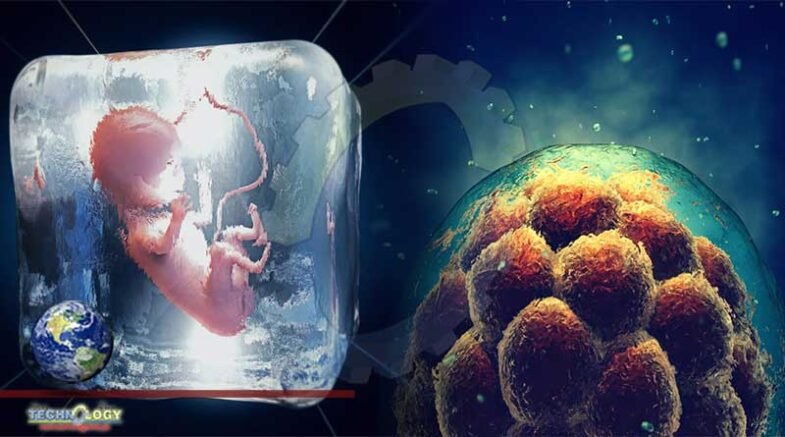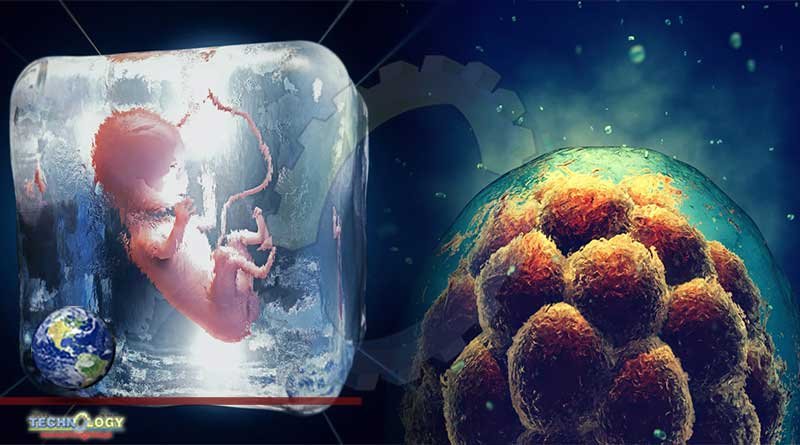A healthy baby girl was born from an embryo that had been frozen for 27 years, a record for the longest a human embryo has stayed frozen.

On Oct. 26, a healthy baby girl was born from an embryo that had been frozen for 27 years, a possible record for the longest a human embryo has stayed frozen before being born, according to recent news reports.
Molly Everette Gibson was born from an embryo frozen in 1992 and stored in a cryogenic (ultra-cold) freezer in the Midwest, according to The Washington Post. In 2012, the embryo was packed into a liquid nitrogen shipping container and sent to an embryo adoption facility; in February of this year, the embryo was implanted into now 29-year-old Tina Gibson’s uterus, who was herself only 1 year old when the embryo was frozen.
Molly’s journey breaks the record set by her biological older sister, Emma Wren Gibson, whose embryo was frozen for 24 years before Gibson gave birth to her. So theoretically, how long can embryos stay frozen for?
“Indefinitely,” said Barry Behr, a professor of obstetrics and gynecology at Stanford University Medical Center.
Through a process called cryopreservation, embryos — a group of cells that mark the earliest stage of human development — are frozen and stored in liquid nitrogen at minus 320 degrees Fahrenheit (minus 196 degrees Celsius), a temperature that stops all biological activity, Behr told Live Science. “If all biological activity has ceased, then you essentially hit the pause button and things should resume when you take the pause button off.”
Even if an embryo is put on pause for decades, once it’s thawed and implanted, it will continue to grow naturally. While there’s no limit to how long you can freeze an embryo biologically, there are outside factors that can damage the embryo, Behr said.
Ionizing radiation from the sun “arguably puts some sort of limit on the indefinite lifespan” of the frozen embryo because it can cause little mutations or damage to the cells’ DNA, Behr said. The radiation can penetrate through any material except for lead — even the giant stainless steel or aluminum thermoses where frozen embryos are kept. But experts have hypothesized that it would still take up to a couple of hundred years, or a couple of lifetimes, for this radiation to “substantially” affect the viability of the embryo, he said.
Dr. Mary Ellen Pavone, an associate professor of obstetrics and gynecology at Northwestern Medicine in Illinois, agreed that with modern freezing methods, embryos can “be pretty much stored indefinitely.”
The field of embryology and freezing methods have both greatly advanced since the time when experts first started freezing embryos in the 1980s, Pavone told Live Science. Embryos used to be frozen using a slow-freezing method, and are now frozen with a very fast-freezing technique called “vitrification,” she said.
What’s more, embryos are now frozen at a later developmental stage, when they’re more robust; in the early days, embryos were frozen when they were made up of two cells or six to eight cells, now they’re frozen when they have over a thousand cells, Pavone said.
Evidence hasn’t shown any health differences in babies that were born from frozen embryos when compared with babies born from fresh embryo transfers, Behr said. There are slight differences reported in the literature between the two, but those are differences in the endometrium, or mucous membrane of the surrogate’s uterus, rather than the embryo, he said.
The vast majority of implanted embryos that don’t result in pregnancy have intrinsic abnormalities, ones that were not caused by the freezing process, Pavone said. But if an embryo frozen for many centuries did achieve pregnancy, “there’s really nothing that suggests that pregnancy would be altered because of the length of time that the embryo is frozen,” she said.
Still, embryos are “typically not stored indefinitely because patients come back to use them,” Pavone said. Parents can also choose to donate them or have them thawed and discarded, she said. To store their embryos, people have to pay yearly fees, she said. Eggs can be similarly preserved indefinitely, Pavone said, but because an egg is a single cell, the success rate for egg implantation is lower than it is for embryos that have the strength of multiple cells.
Originally published at Live Science
